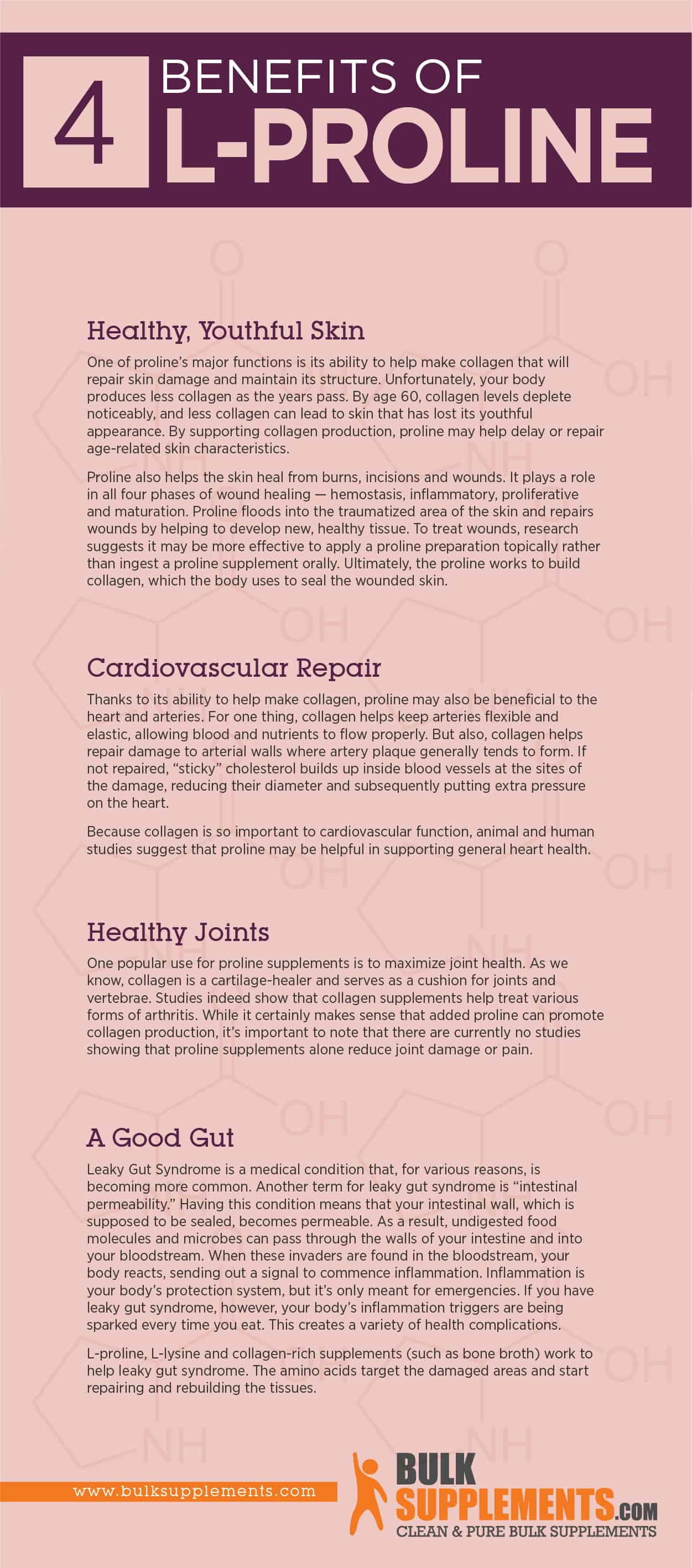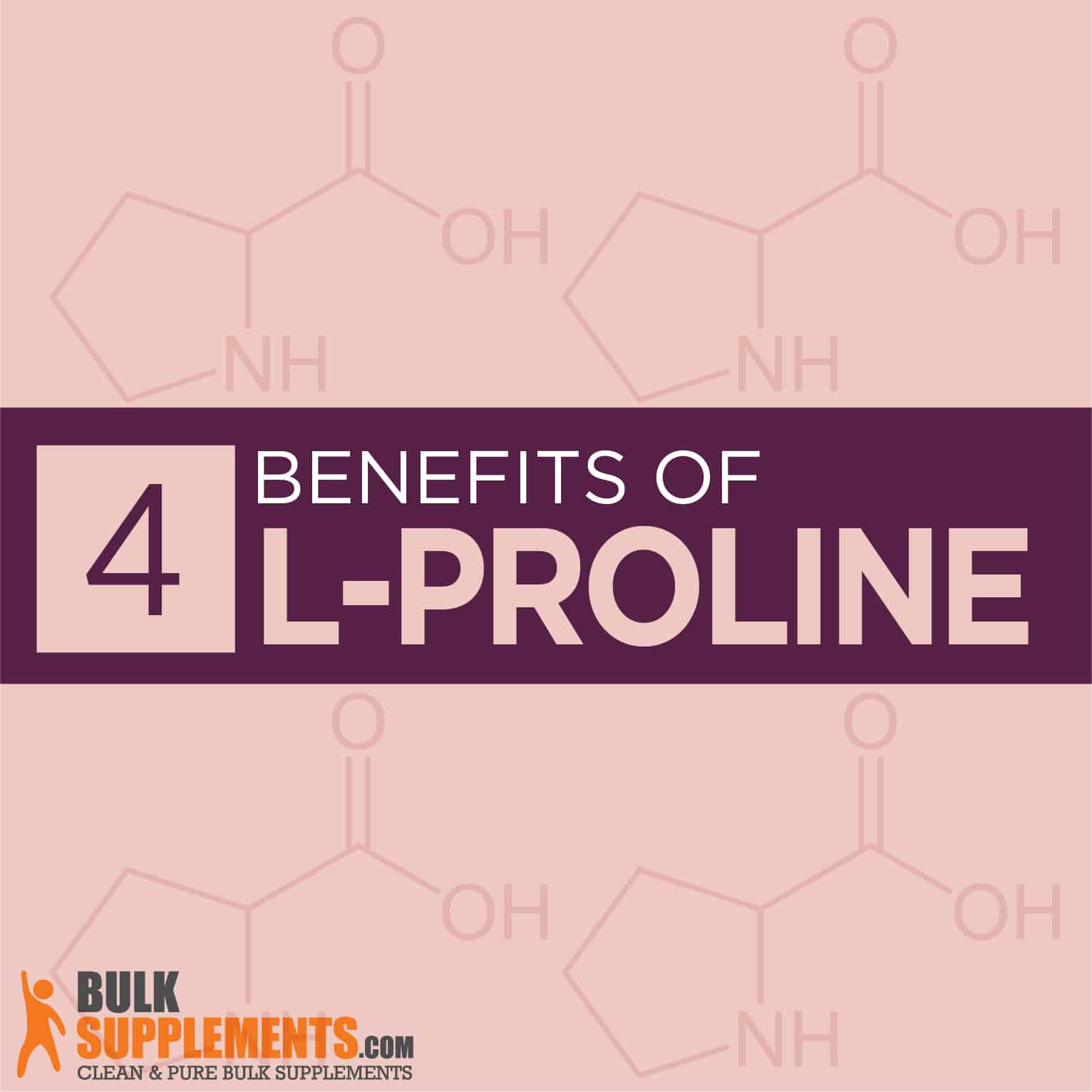What is L-Proline?
L-proline is an amino acid. Scientists call it an “imino acid” or a “secondary” amino acid because of its unique chemical bonding structure as an essential element to collagen — a supportive protein for skin, bones, tendons, and connective tissue, supporting their health and healing. (x) L-proline can develop internally without relying on foods and supplements. Your body generates it from an amino acid called glutamic acid and other amino acids. (x) Because of this, it’s considered a “non-essential” amino acid as “essential” amino acids cannot generate from your body. You need to supplement them or eat foods containing them.
But the “secondary” and “non-essential” labels don’t mean L-proline is unimportant — quite the opposite. L-proline is a beneficial component that plays a crucial role in the human body. (x)
What is an Amino Acid?
What does it mean to be an amino acid, anyway? Amino acids are building blocks of proteins, enzymes, brain neurotransmitters, and hormones. Like other amino acids, L-proline (or proline for short) is virtually every protein in the body. Proline develops within the body and thrives in protein-rich foods. You can take it in supplemental form. Before you purchase the proline, discuss with your physician about taking any new supplement.
Proline is necessary because it helps repair and builds tissue, maintains healthy skin, eases joint pain and promotes healthy circulation. (x)
L-Proline Benefits
We can’t have a proper discussion about proline without first talking about collagen. Proline is an essential ingredient in collagen. It makes up about 15 percent of proline. Why is collagen so important? As mentioned earlier, it’s the building block of tendons, bones, connective tissue and skin. Eating protein-rich foods can increase proline and collagen levels, as can supplements. Another critical point is vitamin C needs to be present for your body to assimilate the L-proline. Its benefits include:
- Healthy, Youthful Skin
One of the proline’s significant functions is its ability to help make collagen that repairs skin damage and maintain its structure. Unfortunately, your body produces less collagen as each year passes. By age 60, collagen levels deplete noticeably, and less collagen can lead to skin that has lost its youthful appearance. By supporting collagen production, proline may help delay or repair age-related skin characteristics. (x)
Proline also helps the skin heal from burns, incisions and wounds. It plays a role in all four phases of wound healing — hemostasis, inflammatory, proliferative and maturation. Proline floods into the traumatized area of the skin and repairs wounds by helping to develop new, healthy tissue. Research suggests it may be more useful to apply a proline preparation topically rather than ingest a proline supplement orally in treating wounds. Ultimately, the proline works to build collagen, which the body uses to seal the wounded skin. (x) (x)
- Enhances Athletic Performance
Like all amino acids, proline improves athletic performance. If you want an extra boost to your weekend warrior game, endure a tennis match, or last well-beyond a round of golf, try taking proline with other amino acids. (x)
A study performed on eight healthy males showed positive results in taking vitamin C-enriched gelatine capsules that included L-proline. The supplements helped injury preventions and enhance tissue repair during alternating exercise programs. (x)
- Cardiovascular Repair
Thanks to its ability to help make collagen, proline may also benefit the heart and arteries. Collagen helps keep arteries flexible and elastic, allowing blood and nutrients to flow correctly. Collagen helps repair damage to arterial walls where artery plaque forms. If not corrected, “sticky” cholesterol builds up inside blood vessels at the sites of the damage, reducing their diameter and subsequently putting extra pressure and stress on the heart.
Because collagen is so important to cardiovascular function, animal and human studies suggest that proline may help support general heart health. One scientific research shows proline helps your body process collagen. (x) Another study shows the importance of proline in combination with vitamin C generates collagen as a positive result. (x) Frontier Immunology published a scientific report about proline is essential for cardiovascular smooth muscle cell proliferation. The report also emphasized its anti-inflammatory qualities. (x)
- Healthy Joints
One widespread use of proline supplements is to maximize joint health. As studies show, collagen is a cartilage-healer and serves as a cushion for joints and vertebrae. Studies show that collagen supplements help treat various forms of arthritis. (x) Another study showed proline in combination with Arginine treated arthritis. (x)
While it makes sense that added proline can promote collagen production, it’s important to note that there are currently no studies showing that proline supplements alone reduce joint damage or pain.
- A Good Gut
Leaky Gut Syndrome is a medical condition that, for various reasons, is becoming more common. Another term for the leaky gut syndrome is “intestinal permeability.” This condition means that your intestinal wall, usually sealed, becomes permeable — allowing substances to pass through the membrane. As a result, undigested food molecules and microbes can pass through the walls of your intestine and into your bloodstream. When these invaders are in the bloodstream, your body reacts, sending out a signal to begin its inflammation process.
Inflammation is your body’s protection system for only emergencies. However, if you have the leaky gut syndrome, your body’s inflammation triggers are being sparked every time you eat. It creates a variety of health complications such as developing free radicals and oxidizing your body, which lead to diseases like cancer, diabetes, and atherosclerosis (narrowing of the arteries.) (x)
L-proline, L-lysine and collagen-rich supplements (such as bone broth) work to help leaky gut syndrome. The amino acids target the damaged areas and start repairing and rebuilding the tissues. (x)
Click here to buy L-proline powder now

L-Proline in Food
Eating a diet rich in protein and collagen gives your body an excellent source of proline. Beef, liver, lamb, poultry, eggs, and fish are excellent high-protein sources. Because of the collagen levels in gelatin, this is also an excellent source of L-proline. Other sources of L-proline are Cottage and cream cheeses. (x)
As mentioned earlier, eating bone broth is a popular way to boost amino acid and collagen intake. Note that bone broth has several health benefits, from losing weight to building up your immune system. (x) You can make bone broth by using this simple recipe:
- Place 5 pounds of meaty beef bones in a large stockpot. Add ½ cup raw apple cider vinegar and 4 quarts water, and let the mixture sit for one hour.
- Add more water if needed to cover the bones.
- Put in 3 cups each of onions, celery and carrots. Bring to a boil. Skim the scum and foam from the top and discard.
- Reduce to a low simmer, cover and cook for 24-72 hours. Or cook overnight in a slow cooker.
- Add a handful of parsley for extra minerals and flavor.
- Cool and strain the broth, making sure all marrow goes into the broth.
- Add sea salt to taste and enjoy. (x)
Those following a plant-based diet can also find L-proline in foods such as cabbage, asparagus, cucumber, bell peppers, strawberries, beans and wheat. (x)
Possible Cancer Therapy
A scientific study performed on mice proved positive results when testing a supplemental cocktail that included L-Proline. The study showed a mixture of vitamin C, L-lysine, L-proline, and epigallocatechin (EGCG) successfully treated the mice. (x)
Where to Buy L-Proline?
You can purchase L-Proline supplements at BulkSupplements.com. The company is an industry-leading manufacturer and distributor for pure dietary supplements. BulkSupplements.com is not just a consumer brand. It also supplies pure ingredients to other food and supplement brands to make their products. All products at BulkSupplements.com are manufactured and tested according to current and proper manufacturing practices.
Are you interested in trying L-Proline supplements? Contact BulkSupplements.com to place an order.
L-Proline Dosage
Other than food sources, L-proline is available in powder and capsule form. There is no standard recommended dose for proline supplements. Take as directed on the product package, or as directed by your physician.
L-Proline Side Effects
If you have liver or kidney disease, consult your doctor before taking any amino acid supplement. Taking large amounts of amino acids can have adverse reactions, causing toxicity levels in your body or an imbalance of amino acids. (x)
The Bottom Line
We say amino, and scientists say “imino.” But either way, L-proline is an active chemical in the body. It works together with other amino acids and vitamin C to form collagen that helps build tissues, and it’s always on the alert for body repairs. Blood vessels, intestinal lining, joints and skin are all target areas that benefit from proline.
The only known side effects are reactions from taking too much L-proline, like all amino acids. It causes toxicity levels and amino acid imbalances in your body. Talk with your medical practitioner about taking any amino acid if you have kidney or liver disease.
Your body efficiently manufactures proline when a person’s diet contains adequate-protein, and vitamin C facilitates its absorption. Conditions such as arteriosclerosis, joint pain, leaky gut, skin issues and demanding sports routines may benefit from a proline boost.
Drinking bone broth, adding protein-packed foods or taking a supplement are all ways to ensure you are getting enough. Whichever way you get it, proline seems to be an essential piece of the body’s puzzle.
The statements in this article have not been evaluated by the Food and Drug Administration. These products are not intended to diagnose, treat, cure, or prevent any disease.


